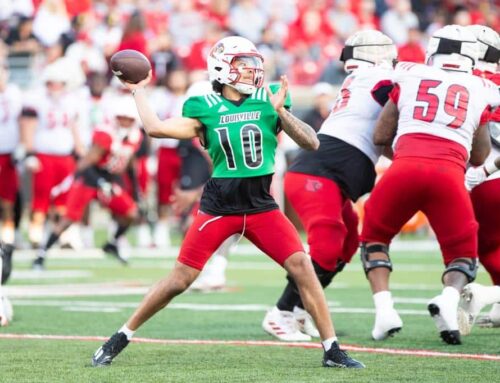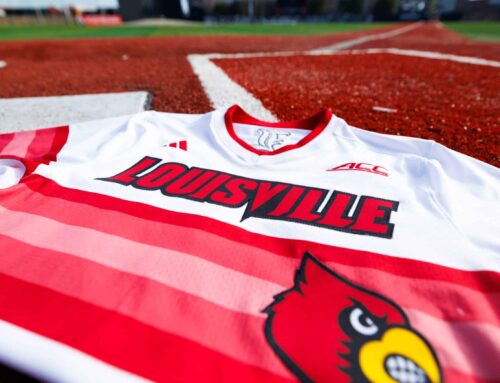By Ian Wooldridge–
What type of message is the National Basketball Association sending? Ever since the implementation of their age requirement rule, much debate has been stirred and controversy has surrounded it – especially lately, as there has been a wave of NBA-ready players coming through college basketball. The NBA requires that a prep ball player must be at least 19 years old before entering the NBA draft, thus leading them to attending college for at least one year. The reasoning for this is that the NBA wants to encourage going through higher education. By forcing them to go to school for one year, the mission is accomplished, right? Not quite. The NBA began to grow increasingly concerned about the mass emphasis on the prep-to-pro phenomenon, so they thought that they had to put the hammer down and make a statement. Essentially, the NBA set the 19-year-old age requirement back in an attempt to avoid the number of players from entering the draft that basically weren’t close to being ready to play at the professional level. These players are what they are trying to avoid. Wasting draft picks on them is very bad “because draft picks are very valuable things,” as NBA Commissioner David Stern says.
These players are often referred to as “busts” or “flame-outs.” Let us take a glance at a few of the most important and vital questions regarding this issue. First, who is affected by the rule? The NBA themselves are not the only ones who have been put in an awkward position because of their age-limit requirement. Then, what could be the most feasible replacement to the rule?
The NBA’s age requirement rule does not just affect their business, it affects the prep basketball players that dream of representing them some day. The NCAA—by the NBA’s implementation and restriction—is put in a very awkward position. The NCAA stands strong in their mission and creed to place an emphasis and identity on these athletes and kids as students first, hence the name “student athlete,” and rightfully so. The NCAA represents universities and colleges everywhere that hold a very high educational and academic standard.
Essentially, the NCAA represents all of these schools; and they do so by way of being the organization and representation of their schools’ athletic and sports programs. What does this mean, and how is the NCAA affected? This means that many prep players that would have gone straight to the NBA now have to play at least one year of college ball, while knowing that once the season ends, they will be entering the draft and then making millions.
One of the reasons that the NBA set this rule in place was to encourage the earning of an education for these kids. Doesn’t this seem to take away from education, however? No matter how smart the kid may be, how incredible his work ethic may be or how much he studies and participates in class, a kid simply staying one year at school and then leaving does not reflect this part of the rules’ reasoning. It does not, because that education was left incomplete and not finished. The NCAA is all about the education of their athletes. On the NBA’s part, is there truly an encouraging of the earning of an education in this? I certainly do not think so.
Unfortunately, one of the main reasons behind the age requirement rule was to disable the entering of kids that may not be truly ready. Therefore, a “valuable” draft pick would not be wasted.
I understand completely that the NBA is a business first. For everyone involved, the NBA is his or her livelihood. A draft pick could be the fine line that separates someone from whether they have a job or not. A lot truly does ride on a draft pick. I understand that. But I believe, however, that it is truly unfair for the kids to be forced to go to school if they, in their hearts, feel that they are ready for the leap.
They should be able to take that chance if they want to. College is not a requirement for everyone else, so why must it be a requirement for prep basketball players? If a kid graduates from high school, he should be able to apply for any job, right? Now, obviously the NBA isn’t just some ordinary job.
The payoff of ruining a draft pick is a lot less tragic in the grand scheme of things than the payoff of a kid not only completing a mere fourth or so of their education, but also than the payoff of possibly ruining any chance that they may have at all by getting injured while playing college basketball during the one year that they were forced to.
Now I do understand that not every player is the next Kobe Bryant, LeBron James or Derrick Rose. Playing college basketball is what the vast majority of youngsters need to be doing if they want to be ready for the NBA. But, the difference between Bryant, James and Rose and everyone else is that the former had a choice.
They could have played ball in college if they wanted to. However, they would be wasting their time by doing so. The same can be said for many of today’s “one and done” players as well. This plays into what I had mentioned previously: nobody else is required to go to college, so why should basketball players be required to do so?>
This leads me to my final question: what is the most feasible replacement to the NBA’s age restriction rule? For me, I believe that Major League Baseball has it right. They allow kids to enter their draft as soon as they graduate. But if the kid decides to play in college first, he would then have to stay for three years. Would this work for college basketball? I believe so.
This would ensure that not only does the player have the choice, but it would also ensure that a college education would be encouraged and obtained at a much more consistent rate for these special athletes, thus reflecting the NCAA and their schools very well. Would this clear the problem of risking draft picks on players that might not be ready? No, it would not.
But that should simply be a risk that the NBA is willing to take. At the end of the day, it is the kids’ future that is most important. They should have their own voice and say in their own future. If they’re ready, they should be allowed take the leap and fulfill their dreams; even at the risk of “flaming out.” If they are not quite ready, they should be able to go to college, grow and develop as an athlete for at least three years, and earn an education while doing so. I believe that is the most viable option in making both parties—the NBA and the NCAA—happy and prosperous.
[email protected]
Illustration by Baylee Pulliam/The Louisville Cardinal





